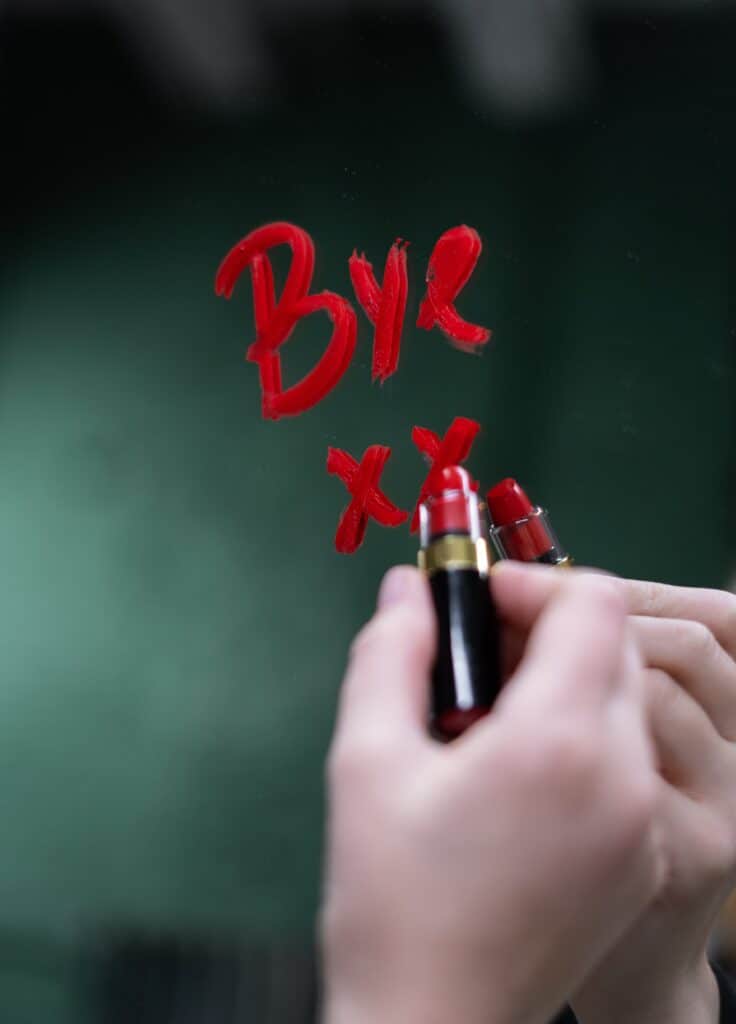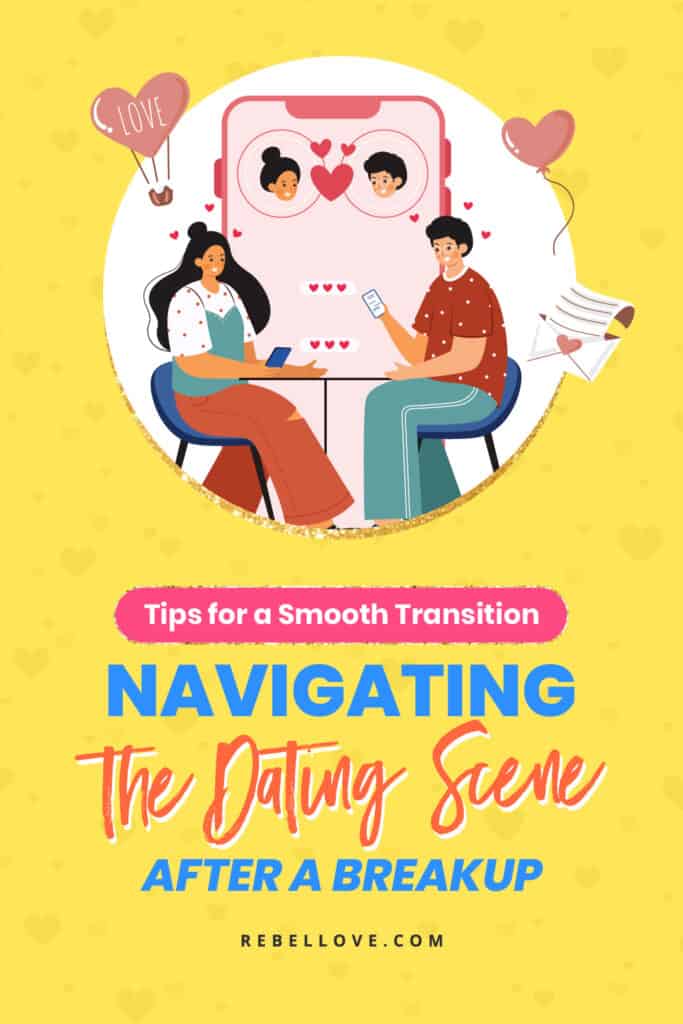This post may contain affiliate links and Rebel Love may be compensated for purchases visitors make through these links. We only promote products and services we really care about and that we think are useful. Read the full policy here.
During my last breakup, I was a mess – and not a hot one!
I felt anxious, depressed, and just not myself on so many levels. My insides felt like a danger zone, and I wasn’t equipped to take on that grief and sadness alone.
In summary: it was the worst I’ve ever felt.

Breakups – especially from long-term partnerships – are unique in the way they hit us, but similar in terms of bringing about change that, for better or (seemingly) worse, requires an intentionality that can be challenging but also lead to personal growth.
Ending that relationship was like untangling myself from a web of complications and toxicity that made me feel like I didn’t matter and had no sense of purpose.
I’ve always been an anxious person, but when it all came crashing down, I had to face the harsh truth—I had wrapped my entire identity around that relationship. So, when it was over, I felt completely lost, and a new level of anxiety hit me like a ton of bricks.
Fortunately, with the unwavering support of my family and a solid grasp of psychology, I made a conscious effort to be intentional in my approach to healing after the breakup, and so, I took the proper steps to ensure my full recovery, which is what I want for you…
Whether or not your breakup is/was as intense as mine, it’s doubtful you’ll walk away entirely unscathed. And, if you leave those hurt or internal conflicts unchecked, you risk letting them grow deeper roots.
In the words of some Instagram word wizard (or some genius they stole it from – sorry, didn’t catch any names):
What we don’t change, we choose.
That includes our relationship to our past…
Because I know personally how critical the time after a breakup can be for rebuilding individuality, self-worth, and a positive worldview, I wanted to craft a summary of practical tools to help others navigate this transitional phase with more confidence and, yes, intention, with the goal of getting you back out on the dating scene!
There’s nothing in here that I, or someone I love, hasn’t put into place without experiencing positive results. As you enter into this next chapter, I only ask that you keep one thing in mind:
Do not underestimate the power of small but consistent action.
It’s quite literally how real change is forged.
Emotional Readiness
I won’t lie, it took me a minute to get intentional with my healing.
The months following the breakup included heavy drinking, one-night stands, and attaching myself to meaningless relationships only to combat my lack of self-worth.
Can you guess how that panned out?
Ya, not so good.
Self-awareness is the starting line to any type of change or growth. It isn’t a coincidence that the first step in any recovery program is:
Admitting you are powerless over a specific issue or behavior and recognizing the negative impact it has (had) on one’s life.

Without this step, there is no forward movement. You need to know what has to change in order to change it.
In my case, I grappled with low self-esteem because my sense of worth was tethered to others’ perceptions of my desirability and lovability.
When I look back on my previous relationship, I recognize that I attached myself to him believing that if I could be the exception to his rule (i.e., be the woman he loves and doesn’t lie to or cheat on), it would prove I’m special.
**LOUD SIGH**
So, whether you’re eager to get back into the dating world or not, it’s important to understand where you are emotionally so you can set realistic expectations and approach your dating life accordingly.
Here are a few tools you can use to take the temperature of your emotional readiness:
Journaling:
Expressing your thoughts and emotions on paper allows for self-reflection, helping you gain clarity on your feelings and readiness for dating.
Therapy:
Professional counseling provides a supportive space to explore and address emotional challenges, aiding in the healing process and preparing you for healthy relationships.
Choosing the Right Timing
When you start doing this work and understanding your emotional readiness, I suggest committing to a timeframe to (re-)build a positive mindset and focus on becoming emotionally healthy post-breakup before dating again.
I get it may feel odd to put limitations on your love life, but think of this more as a moving goalpost. Depending on your progress, which will inevitably ebb and flow, this can be adjusted. The point here is to dedicate yourself to personal growth instead of investing solely in the quest for an ideal partner.
Why?
When you prioritize self-development and engage in activities you’re passionate about, you’ll naturally draw in more satisfying relationships that resonate with your best self.
Before meeting James, I had begun the process of healing. Even if I hadn’t reached full recovery when he came into my life, I’d made a personal commitment to prioritize it. This dedication became a pivotal factor in the success of my relationship with James. His recognition and support for my commitment to personal growth confirmed that he was the right partner for me.
Funny enough, my commitment to self unintentionally became a litmus test for finding my ideal partner.
Here’s how you can determine the best timeframe for you:
Set Realistic Goals:
First, establish realistic and achievable goals for your personal growth. Mine was related to self-esteem. What is it you’re working on? Break down your objectives into smaller, manageable steps. This not only gives you a clear roadmap to help gauge progress but also allows you to adjust your timeframe based on the pace of your emotional healing and development.
You can also set these goals with the help of a therapist.
Social Reintegration:
When ready, gradually reintroduce yourself to social settings and activities to help gauge your comfort level, allowing you to assess your emotional readiness for dating.
My suggestion is to approach this with no romantic expectations; consider entering the experience with the anticipation of making new platonic connections and relishing in the enjoyment of novel environments and activities.
You never know who could show up and when…
Regular Check-Ins:
Schedule regular check-ins with yourself to assess your emotional well-being and the progress you’ve made.
I’m an avid writer and journal every day. You don’t have to be as intense as I am, but finding a way to sit down and compare how you’re doing this week versus last, for example, will keep you on track. Your version of this may be meditation, or a long, intentional walk.
Use these moments of self-reflection to evaluate whether the chosen timeframe still aligns with your current needs and circumstances. Remain flexible.
Setting Clear Dating Intentions
In case you don’t accidentally run into your future husband/wife in an amusement park line like I did, you may need to set some clear intentions around how you’d like to approach the dating scene. Here are my suggestions:
Create a Dating Vision Board:

Develop a visual representation of your dating intentions by creating a dating vision board. Use images, words, and symbols that reflect the qualities, values, and experiences you seek in potential partners.
Regularly review your vision board to reinforce your dating intentions. This visual reminder can help you stay focused on your goals and attract relationships aligned with your aspirations.
Before I met my husband, I would write love letters to him, detailing what we would do together, the qualities I loved about him, and how he made me feel. It really helped prime my brain for relationship qualities that were non-negotiable and gave me a glimpse of how I wanted to feel in the right relationship.
Define Non-Negotiables and Preferences:
Clearly outline your non-negotiables (essential qualities or values) and preferences (desirable but not mandatory attributes) for potential partners. This can be a written list or a visual representation.
Review and refine your list regularly. This tool helps you articulate your boundaries and priorities, guiding your decisions in the dating process. Share these non-negotiables and preferences with potential partners when appropriate.
Navigating Online Dating
I wanted to put a specific blurb in here about online dating. It isn’t for everyone (it wasn’t for me…), but for those who want to broaden their field, it’s a viable option.
Because online dating isn’t for me, I asked one of my favorite couples (who it did work for) to give me some advice. One of those people is my sister. She met her 6’2″, beautiful and kind-hearted, red-headed giant online. Here’s what they said:
My Sister:
Online dating became a success for her once she embraced clarity and honesty in her pursuit. She specified her desire for a lifelong partner. She observed a common trend among women in her social circle and refused to default to the expectations and wants of the men she dated.
Injecting a touch of humor into her profile, she playfully declared, “I don’t care about your shirtless photos. I care about your relationship with your family.” This unapologetic stance not only showcased her priorities but also weeded out those not aligned with her values.
Essentially, she navigated the online dating landscape with a refreshing level of authenticity. Remaining steadfast in her wants, she even took the liberty to exit dates—sometimes quite literally—if comments veered away from her core values. This commitment to self-awareness and assertiveness proved to be the cornerstone of her successful online dating experience.
Brother-in-Law:

My brother-in-law was a serial dater with a five-year record of online dating, which began after his last breakup.
He openly shared that his breakthrough only came when he delved deeper into what he truly wanted, separating societal and peer expectations from his authentic needs.
Initially influenced by the notion that casual flings should bring excitement and satisfaction, he realized that this societal expectation didn’t align with his own values and desires.
His turning point came when he set a clear goal for himself: a long-term, serious relationship. His previous approach was to continue with casual relationships until the right person came along.
When he took time to get clear with himself and stop the casual dating, my sister came along. Recognizing her as someone worth fighting for, he was able to do so wholeheartedly because his intentions and desires were unequivocal.
If we can glean anything from my sister and brother-in-law’s successful online dating experience, it’s this:
Define Your Intentions Clearly:
Before delving into the online dating world, take the time to clarify your intentions and what you’re seeking in a relationship. Whether it’s a casual connection or a serious commitment, having a clear understanding of your goals will help you communicate effectively and attract individuals with compatible expectations.
Craft an Authentic Profile:
Create a dating profile that authentically reflects your personality, interests, and values. Use genuine photos and write a bio that provides potential matches with a glimpse into who you are. Transparency in your profile encourages meaningful connections and helps filter out those who don’t align with your true self.
Honest Communication from the Start:
Foster open and honest communication with your matches. Be transparent about your expectations, and encourage them to share their intentions as well. Establishing clear communication early on sets the foundation for a more genuine connection and reduces misunderstandings down the line.
Reminder:
The experience of online dating is highly individualized and could manifest differently for each person. The couple I used as an example is a heterosexual, cis-gender couple. Their story does not reflect the entire range of diverse preferences and/or intentions. Lastly, it’s absolutely acceptable if your desired outcome is not a long-term relationship; the key is to be honest with yourself about your expectations and intentions, ensuring clarity and authenticity in your approach.
Addressing Baggage
When James and I first started dating, I was confronted by a lot of unresolved issues that stemmed from my past relationship.
Jealousy, possessiveness, and co-dependent tendencies were among the baggage that surfaced in the beginning stages. Luckily, I had the self-awareness piece in place and understood that in order to heal properly, I had to address the baggage as it presented itself.
This was HARD, but worth it.
If you are still experiencing baggage or having strong negative reactions that you want to eliminate, here’s what you can do:
Self-Reflection Exercises:
Dedicate time for introspection and self-reflection exercises. Journaling, writing letters to your past self, or creating a timeline of significant emotional events can provide clarity on the origins of your baggage. By understanding the patterns and triggers, you empower yourself to make conscious choices and break free from the emotional burdens that may be affecting who and how you date.
Mindfulness Practices:
Incorporate mindfulness techniques into your daily routine to enhance self-awareness and manage negative emotions. Practices like meditation, deep breathing, or journaling can help you stay present, identify triggers, and cultivate a healthier mindset.
Open Communication:
Foster open and honest communication with your partner(s) or support system. Share your struggles and concerns, allowing for a supportive environment that encourages understanding and collaboration. Discussing your emotional baggage can strengthen your connection and create a space for mutual growth.
Also consider therapy.
Balancing Independence and Vulnerability
In the early stages of my healing and getting to know James, I consciously worked on fostering my independence while staying open and vulnerable in our relationship. This marked a significant shift in my life, as I’d never focussed on this before.
Here’s what I suggest:
Personal Boundaries Communication:
Clearly communicate your personal boundaries early in the dating process. Expressing your needs, values, and expectations helps establish mutual understanding and respect for each other’s independence. Setting healthy boundaries ensures that you maintain your individuality while building connections.
Scheduled “Me Time” Practice:
Integrate regular periods of self-care and personal activities into your routine. Whether it’s dedicating time to pursue hobbies, spending moments with friends, or simply enjoying solitude, having designated “me time” contributes to maintaining a sense of independence. This intentional space allows you to recharge individually, making you more present and open when you engage with your date.
Gradual Vulnerability Exposure Technique:
Instead of immediately disclosing your deepest fears and vulnerabilities, consider a gradual approach to sharing personal aspects of yourself. Start by discussing lighter topics and gradually increase the depth of your disclosure as trust builds in the relationship.
This step-by-step process allows both you and your potential partner to feel secure in maintaining individuality while gradually embracing vulnerability in the dating journey.
Managing Rejection and Disappointment
I’m just gonna say it:
Rejection is inevitable.
For this reason, it’s important to learn coping mechanisms to deal with rejection and handle dating disappointments while maintaining a positive outlook.
Build a Support System:
Surround yourself with friends, family, or a support network who can provide encouragement and perspective. Share your experiences with those you trust, allowing them to offer insights and emotional support. Having a reliable support system helps alleviate the impact of rejection, reminding you that your self-worth is not determined by a single dating experience.
Set Realistic Expectations:
Acknowledge that not every dating experience will lead to the type of connection you’re after, and that’s perfectly normal.
Setting realistic expectations helps manage disappointment by understanding that compatibility is multifaceted. Avoid placing undue pressure on yourself or potential partners, and recognize that rejection often serves as redirection toward more suitable connections.
Continue Your Focus on Personal Growth:
Use rejection as an opportunity for self-improvement. Consider areas of your life, interests, or skills that you want to enhance. Channeling energy into personal growth shifts the focus away from external validation and reinforces your sense of self-worth. Engaging in activities that bring you joy and fulfillment contributes to a positive mindset.
Who Should You Date?

Here’s the deal: your priority is YOU.
Breakups require time to emotionally metabolize. It’s not about finding someone new ASAP; it’s about getting back to yourself first.
By focusing on healing and growth, you’ll inevitably evolve, and become a magnetic force that attracts the right people – not just romantically, but in the friend department too.
Remember:
Do not underestimate the power of small but consistent action.
So, take this guide and take your time transitioning back into the dating scene.
Until then…
Quean Mo xx